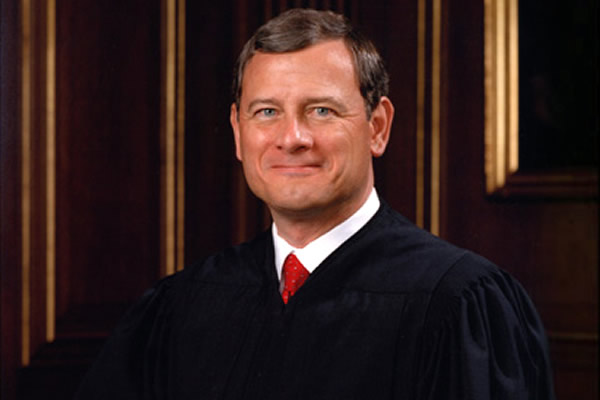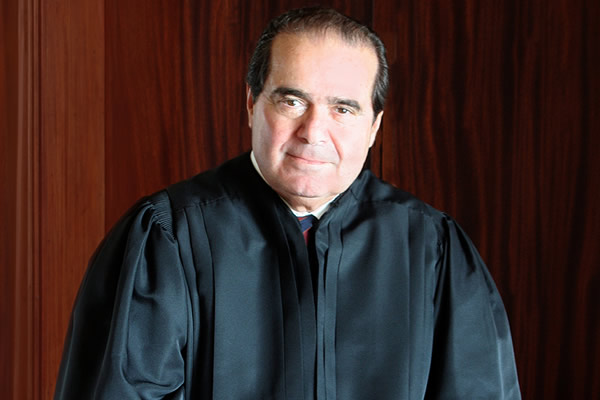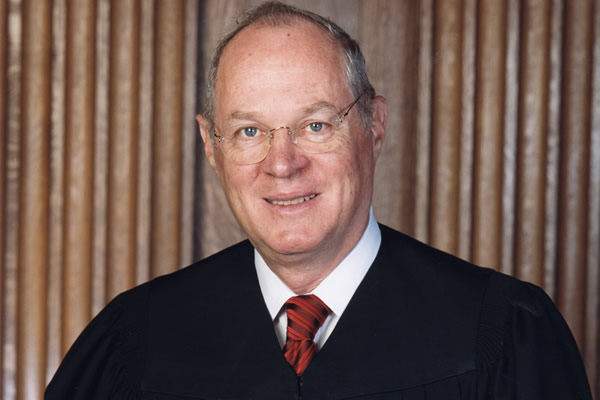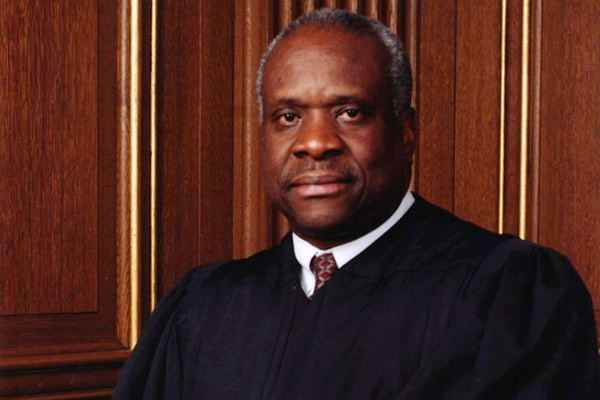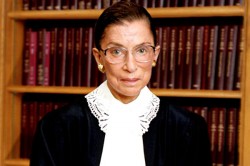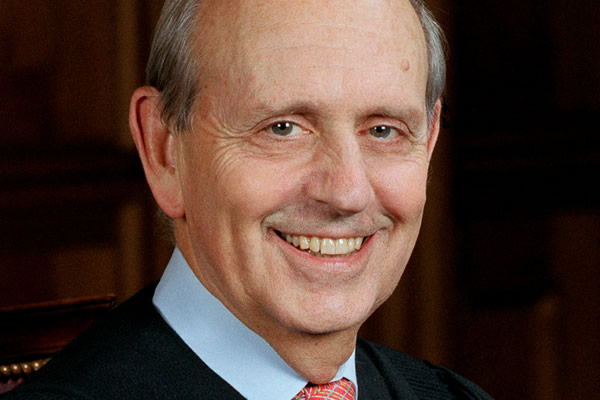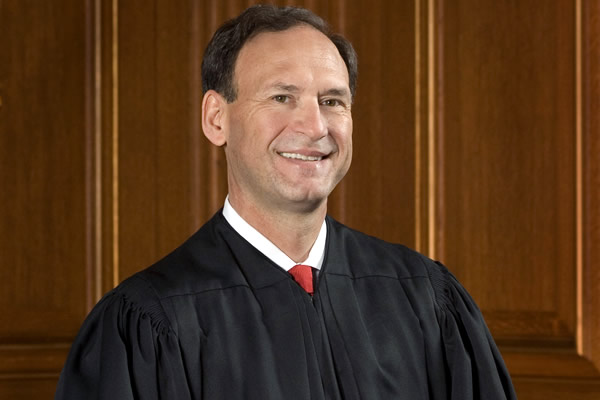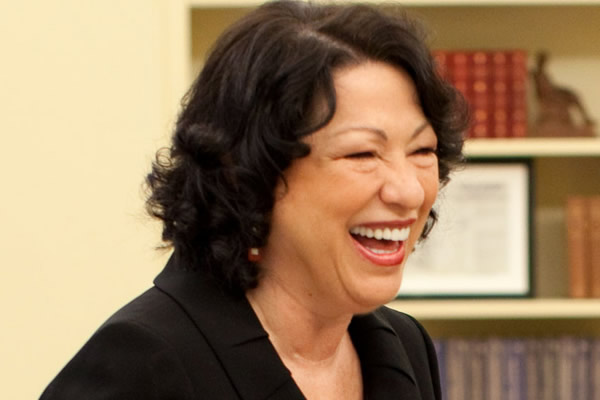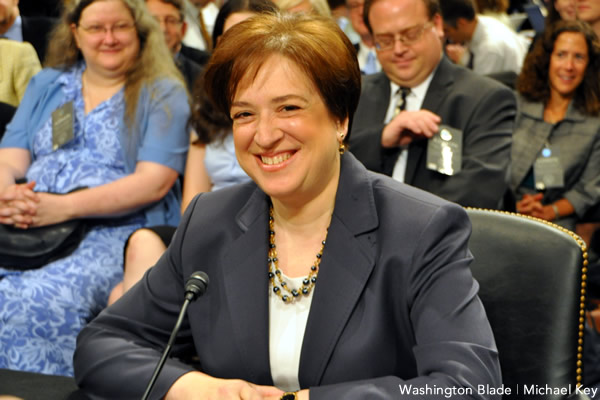National
How will Supreme Court rule on marriage?
Parsing statements, records for hints as to how justices will decide DOMA, Prop 8 cases
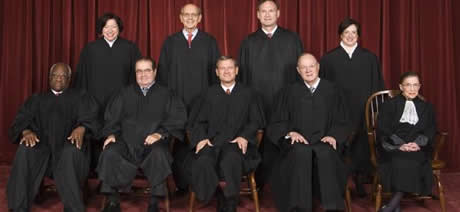
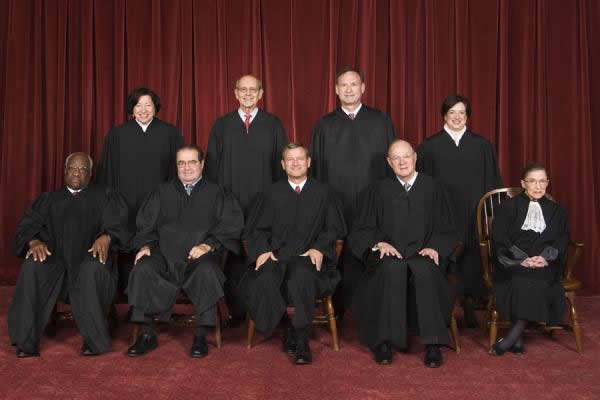
Justices on the U.S. Supreme Court are expected to issue rulings on the Prop 8 and DOMA cases in June. (Photo public domain)
The nine members of the U.S. Supreme Court are expected to reach a decision by the end of June in two high-profile LGBT rights cases on which they heard oral arguments last week challenging California’s Proposition 8 and the federal Defense of Marriage Act.
The justices could reach any number of decisions on either or both of the cases — upholding the anti-gay measures, dismissing the cases for lack of standing or jurisdiction, striking down Prop 8 and DOMA on grounds they violate the rights of same-sex couples under the U.S. Constitution — or even issuing a national ruling in favor of marriage equality.
Predicting how they might rule is tricky. But several of the justices made statements and asked questions during the oral arguments that offered some hints. Perhaps more significantly, many of them have a record of ruling in gay rights cases that might indicate their leanings on marriage. The Washington Blade has compiled profiles of the justices to assess how they might rule in the two marriage cases before them.
In addition to examining their comments during the arguments, the Blade has looked at how they ruled in other high-profile gay rights cases. One is the 1996 case of Romer v. Evans in which the Supreme Court struck down Colorado’s Amendment 2, which would have prohibited municipalities from passing non-discrimination ordinances protecting LGBT people. Another is the 2003 case of Lawrence v. Texas in which the Supreme Court struck down state sodomy laws.
The Blade also looked at the court ruling in the 2010 case of Christian Legal Society v. Martinez. In that case, the court upheld the Hastings College of Law’s non-discrimination policy against a challenge from Hastings Christian Fellowship, which sought to overturn the policy to maintain its status as an official school group while prohibiting LGBT people from holding positions as officers.
1. Chief Justice John Roberts
The chief justice of the Supreme Court seemed skeptical during oral arguments that Prop 8 and DOMA should be struck down as unconstitutional. He also seemed dismissive of the notion that LGBT people lack political power.
In an exchange with attorney Robbie Kaplan, Chief Justice John Roberts disputed that gay people lack political power — a characteristic that the court has considered in weighing whether a group should be considered a suspect class.
“As far as I can tell, political figures are falling over themselves to endorse your side of the case,” Roberts said.
The chief justice was likely referring to the trend of U.S. senators announcing their support for marriage equality, which just this week added Sens. Bob Casey (D-Pa.), Tom Carper (D-Del.) and Mark Kirk (R-Ill.). When Kaplan pointed out that no group has been subject to referenda in recent years like gay people, Roberts seemed unmoved.
“You just referred to a sea change in people’s understandings and values from 1996, when DOMA was enacted, and I’m just trying to see where that comes from, if not from the political effectiveness of groups on your side,” Roberts said.
Roberts, who was appointed by President George W. Bush, hasn’t ruled on many gay rights cases during his time on the bench. Still, Roberts ruled as part of the dissent that deemed exclusion of LGBT students was acceptable in the Christian Legal Society case.
On the other hand, Roberts in 1996 helped gay rights activists as part of his law firm’s pro bono work in preparation for the Romer case. He also has a lesbian cousin, Jean Podrasky, who attended arguments on Prop 8.
Suzanne Goldberg, a lesbian and co-director of Columbia University’s Center for Gender & Sexuality Law, pointed to another comment Roberts made indicating a parent forcing a child to make friends with another child changes the definition of friendship.
“It suggested that he might be less open to recognizing marriage rights for same-sex couples than the Olson-Boies team had anticipated,” Goldberg said.
2. Associate Justice Antonin Scalia
Associate Justice Antonin Scalia, viewed by many as the most anti-gay of the justices, mused that being raised by gay parents may not be good for a child — an argument made by many anti-gay groups.
“If you redefine marriage to include same-sex couples, you must permit adoption by same-sex couples, and there’s considerable disagreement among sociologists as to what the consequences of raising a child in a single-sex family, whether that is harmful to the child or not,” Scalia said. “Some states do not permit adoption by same-sex couples for that reason.”
Those words are consistent with anti-gay views that Scalia has expressed in the past. Most notably, speaking at Princeton in December, Scalia compared bans on sodomy to laws against murder, saying, “If we cannot have moral feelings against homosexuality, can we have it against murder? Can we have it against other things?”
Since his confirmation to the court, Scalia has not only made anti-gay rulings, but has taken the lead on the opinions. The Reagan-appointed justice wrote the dissenting opinions in the Romer and Lawrence cases and joined with other dissenting justices in ruling for LGBT exclusion in the Christian Legal Society case.
Doug NeJaime, who’s gay and a professor at Loyola Law School, said Scalia is likely to rule to uphold Prop 8 and the Defense of Marriage Act.
“Justice Scalia has made clear in earlier opinions … that legislation can be justified merely by moral disapproval of homosexuality, even though a majority of the court has rejected that position,” NeJaime said. “Moreover, under his theory of constitutional interpretation, he does not believe that lesbians and gay men have a constitutional basis for their claims in these cases.”
3. Associate Justice Anthony Kennedy
The justice who’s being most closely watched because of his reputation for being a swing vote — and his previous rulings in favor of gay rights — conveyed mixed sentiments during the arguments.
Associate Justice Anthony Kennedy contemplated the effect that overturning or sustaining Prop 8 would have on children based on the newness of same-sex marriage.
“We have five years of information to weigh against 2,000 years of history or more,” Kennedy said. “On the other hand, there is … what could be a legal injury, and that’s the voice of these children. There are some 40,000 children in California … that live with same-sex parents, and they want their parents to have full recognition and full status.”
A Reagan appointee, Kennedy authored the majority opinions in the Romer and Lawrence cases that struck down anti-gay measures in those lawsuits. In the Christian Legal Society case, Kennedy also ruled in favor of requiring student groups to be open to all students regardless of LGBT status.
That’s what makes Kennedy’s comment questioning the Ninth Circuit ruling against Prop 8, which was largely based on his opinion in Romer, particularly noteworthy.
“The rationale of the Ninth Circuit was much more narrow,” Kennedy said. “It basically said that California, which has been more generous, more open to protecting same-sex couples than almost any state in the union, just didn’t go far enough, and it’s being penalized for not going far enough. That’s a very odd rationale on which to sustain this opinion.”
Nan Hunter, a lesbian law professor at Georgetown University, said the “single most powerful vibe” she received from Kennedy during arguments was his ambivalence.
“My best guess is that in the Perry case, he will rule in some way that avoids discussion of Prop 8’s constitutionality and that in the Windsor case, he will conclude that DOMA is unconstitutional, but his opinion may invoke federalism as much as it does the Equal Protection Clause,” Hunter said.
4. Associate Justice Clarence Thomas
In accordance with his custom, Associate Justice Clarence Thomas remained silent for the duration of oral arguments in the marriage cases.
Thomas is known for not asking questions. In January, after seven years of silence, the George H.W. Bush-appointed justice made news when he broke his tradition and cracked a joke about the competency of an attorney during a case unrelated to marriage.
But Thomas has a history of taking the anti-gay side. He ruled in the dissent in the Romer and Lawrence cases and ruled for LGBT exclusion in the Christian Legal Society case.
Chris Stoll, a senior staff attorney for the National Center for Lesbian Rights, said oral arguments don’t offer any information on how Thomas might rule, but noted the justice’s history of anti-gay opinions.
“He is quite conservative and historically has voted with the other conservative justices in cases involving LGBT equality,” Stoll said.
5. Associate Justice Ruth Bader Ginsburg
One justice who has a history of ruling in favor of gay rights indicated a disdain for DOMA during oral arguments.
Associate Justice Ruth Bader Ginsburg said the 1996 law creates two different kinds of unions for same-sex and opposite-sex couples: “the full marriage, and then this sort of skim milk marriage.”
While questioning attorney Paul Clement, Ginsburg more distinctly articulated the problems for gay couples under DOMA by enumerating benefits denied to them under the law.
“The problem is if we are totally for the states’ decision that there is a marriage between two people, for the federal government then to come in to say no joint return, no marital deduction, no Social Security benefits; your spouse is very sick but you can’t get leave; people — if that set of attributes, one might well ask, what kind of marriage is this?” Ginsburg said.
Ginsburg also has a history suggesting she’d be willing to rule against Prop 8 and DOMA. The Clinton-appointed justice ruled in favor of LGBT advocates in the Romer, Lawrence and Christian Legal Society cases. Prior to her confirmation as a Supreme Court justice, Ginsburg was a women’s rights advocate and co-founder of the women’s rights project at the American Civil Liberties Union.
David Gans, civil rights director for the progressive Constitutional Accountability Center, said he considers Ginsburg a likely vote to strike down DOMA and Prop 8 based on her history of rulings and comments made in court.
“I think her comments tended to be across the board very skeptical of the justifications offered, and, of course, her record, both as an advocate and justice is to honor the constitutional guarantee of equal protection applies to all persons,” Gans said.
6. Associate Justice Stephen Breyer
The other Clinton appointee on the bench also made comments during the Prop 8 arguments suggesting he might rule in favor of marriage rights for gay couples.
Associate Justice Stephen Breyer was dismissive of Cooper’s assertion that marriage is for procreation, observing California allows straight couples who cannot have children to marry.
“What precisely is the way in which allowing gay couples to marry would interfere with the vision of marriage as procreation of children that allowing sterile couples of different sexes to marry would not?” Breyer said. “I mean, there are lots of people who get married who can’t have children.”
And Breyer’s earlier rulings suggest he would be amenable to striking down Prop 8 and DOMA. Breyer joined Kennedy and other justices in the pro-gay rulings for Romer and Lawrence and sided with LGBT inclusion in the Christian Legal Society Case.
Gans said Breyer’s comments during the Prop 8 arguments indicate his rulings on the anti-gay measures will likely be consistent with his earlier decisions.
“Justice Breyer’s questions during oral argument suggested that he would find that discriminatory marriage laws violate the constitutional guarantee of equal protection for all persons,” Gans said.
7. Associate Justice Samuel Alito
Associate Justice Samuel Alito expressed concerns about same-sex marriage, quipping that it’s “newer than cell phones or the Internet.”
“Same-sex marriage is very new,” Alito said. “I think it was first adopted in the Netherlands in 2000. So there isn’t a lot of data about its effect. And it may turn out to be a good thing; it may turn out not to be a good thing, as the supporters of Proposition 8 apparently believe.”
An appointee of President George W. Bush, Alito hasn’t been on the court long enough to have ruled in the earlier landmark Lawrence and Romer cases. But he wrote the dissenting opinion in favor of LGBT exclusion in the Christian Legal Society case.
Lavi Soloway, a gay immigration attorney and co-founder of The DOMA Project, said he expects Alito to be consistent and issue an anti-gay decision in the cases before him — taking note of the exchange in the Prop 8 case.
“This line of thinking was disappointing; it not only belittled the fight for equality, but suggested that Justice Alito would first need to be convinced of the ‘effects’ of same-sex marriage before he could determine whether gay and lesbian Americans have a constitutionally protected right to marry,” Soloway said. “This exchange suggested to me that Alito will most likely vote to uphold Prop 8, preferring that legislatures continue to wrestle with this issue.”
8. Associate Justice Sonia Sotomayor
Another justice — this one appointed by President Obama — asked some of the most pointed questions about whether there’s any reason anti-gay laws could survive the court’s lowest standard of review.
Associate Justice Sonia Sotomayor pressed attorney Charles Cooper on whether he could conceive of anti-gay laws on other issues other than marriage that could survive rational basis review. The answer from Cooper was that he could not.
“If that is true, then why aren’t they a class?” Sotomayor responded. “If they’re a class that makes any other discrimination improper, irrational, then why aren’t we treating them as a class for this one thing?”
Sotomayor’s response suggests she might agree with the Obama administration that laws related to sexual orientation should be subjected to heightened scrutiny, or a greater assumption they’re unconstitutional.
A newcomer to the court, Sotomayor hasn’t had the opportunity to rule on many of the earlier LGBT rights cases that have come before the bench. But in the Christian Legal Society case, she joined four other justices in ruling student groups had to accept all students regardless of LGBT status.
Notably, Sotomayor was the only one among nine justices who responded to a letter from a North Carolina 6th grader named Cameron urging justices to rule in favor of marriage equality. The justice said she had no comment on the marriage cases, but urged Cameron to keep “dreaming big.”
NCLR’s Stoll pointed to Sotomayor’s exchange with Cooper as evidence she’d rule against Prop 8 and had similar expectations for how she’d rule on DOMA.
“She seemed perplexed and unpersuaded by Cooper’s argument that excluding gay people from marriage somehow promotes ‘responsible procreation’ by different-sex couples,” Stoll said.
9. Associate Justice Elena Kagan
Yet another justice appointed by President Obama seemed skeptical about arguments presented by proponents of Prop 8 and DOMA.
Associate Justice Elena Kagan suggested to attorney Paul Clement that Congress may have had another motive other than uniformity when it determined to pass the anti-gay law.
“This was a real difference in the uniformity that the federal government was pursuing,” Kagan said. “And it suggests that maybe something — maybe Congress had something different in mind than uniformity.”
Clement offered a lengthy response in which he talked about federal bans on polygamy and laws after the Civil War allowing freed slaves to marry. But Kagan responded by reading from the House report on DOMA, which states the law was passed “to reflect an honor of collective moral judgment and to express moral disapproval of homosexuality” — deemed a “gotcha” moment that elicited laughter from those in the courtroom.
During the Prop 8 arguments, Kagan was also skeptical of Cooper’s argument that the purpose of marriage is procreation and asked for a legitimate reason for excluding same-sex couples from marriage.
“Is there any reason that you have for excluding them?” Kagan said. “In other words, you’re saying, well, if we allow same-sex couples to marry, it doesn’t serve the state’s interest. But do you go further and say that it harms any state interest?”
Like Sotomayor, Kagan is a relative newcomer to the court and hasn’t had the opportunity to rule on gay cases. During her confirmation hearing, Kagan wouldn’t say whether the she thinks the U.S. Constitution guarantees same-sex couples the right to marry.
Still, Loyola’s NeJaime said Kagan seemed bothered during oral arguments by equal protections concerns presented by Prop 8 and DOMA.
“Given her lengthy questions about the relationship between age and procreative ability, she seems unconvinced by the ‘responsible procreation’ rationale for same-sex marriage bans,” NeJaime said. “And given her reading of the House report on DOMA regarding the ‘moral disapproval of homosexuality,’ she is suggesting that the law may not survive rational basis review.”

Texas state Rep. James Talarico won a hard-fought primary Tuesday to become the state’s Democratic nominee for U.S. Senate, defeating U.S. Rep. Jasmine Crockett in one of the year’s most closely watched and competitive Democratic contests.
Talarico, a Presbyterian seminarian and three-term lawmaker from Round Rock, was declared the winner by the Associated Press early Wednesday morning after a closely tracked vote count that drew national attention.
“Tonight, the people of our state gave this country a little bit of hope,” Talarico told the AP. “And a little bit of hope is a dangerous thing.”
With 52.8% of the vote to Crockett’s 45.9%, Talarico secured the nomination outright, avoiding a runoff and capping months of sharp contrasts between the two candidates over strategy, messaging, and how best to compete statewide in Texas. Democrats hope the competitive primary — and the relatively narrow margin — signals growing momentum in a state that has not elected a Democrat to the U.S. Senate since 1988.
Talarico has long expressed support for the LGBTQ community, a position he highlights prominently on his campaign website. Under the “Issues” section, he directly addresses assumptions that might arise from his faith and background as a seminarian in a deeply conservative state.
“My faith in Jesus leads me to reject Christian Nationalism and commit myself to the project of democracy,” his website reads. “Because that’s the promise of America: a democracy where every person and every family — regardless of religion, race, gender, sexual orientation, or any other difference between us — can truly be free and live up to their full potential.”
Crockett struck a conciliatory tone following her defeat, emphasizing party unity ahead of November.
“This morning I called James and congratulated him on becoming the Senate nominee,” Crockett told Politico. “Texas is primed to turn blue and we must remain united because this is bigger than any one person. This is about the future of all 30 million Texans and getting America back on track.”
Talarico also drew national attention earlier in the race when “Late Show” host Stephen Colbert said he was initially unable to air an interview with the state legislator due to potential FCC concerns involving CBS. The episode sparked a broader political debate.
Brendan Carr, chair of the Federal Communications Commission, appointed by President Donald Trump, told reporters the controversy was a “hoax,” though he also acknowledged Talarico’s ability to harness the moment to build support as an underdog candidate. The interview was later released online and garnered millions of views, boosting Talarico’s national profile.
In November, Talarico will face the winner of the Republican primary between incumbent Sen. John Cornyn and Texas Attorney General Ken Paxton, who have been locked in a bruising GOP contest. Rep. Wesley Hunt was also in the Republican primary field. The GOP race is expected to head to a May runoff.
In a joint statement, Senate Minority Leader Chuck Schumer and Democratic Senatorial Campaign Committee Chair Kirsten Gillibrand praised Talarico’s victory and framed him as a candidate capable of broad appeal.
“As an eighth-generation Texan, former middle school teacher, and Presbyterian seminarian, James will be a fighter for Texans from all walks of life and of all political stripes,” they said. “In November, Texans will elect a champion for working people: James Talarico.”
National
Peter Thiel’s expanding power — and his overlap with Jeffrey Epstein
Gay billionaire’s name appears 2,200 times in files, but no criminality alleged

There are few figures in modern politics whose reach extends across Silicon Valley, Wall Street, and Washington, D.C., as Peter Thiel’s.
A billionaire venture capitalist, Thiel built his fortune at the dawn of the internet age and has since positioned himself at the highest levels of U.S. technology, finance, and national defense infrastructure. He is best known as a co-founder of PayPal, an early investor in Facebook, and the co-founder of Palantir Technologies — a data analytics firm that maintains significant contracts with U.S., U.K., and Israeli defense and intelligence agencies.
Over the last two decades, Thiel has also built an interconnected network of investment vehicles — Clarium Capital, Founders Fund, Thiel Capital, Valar Ventures, and Mithril Capital — giving him influence over emerging technologies, political candidates, and ideological movements aligned with his worldview. Through these firms, Thiel has backed companies in artificial intelligence, defense technology, biotech, cryptocurrency, and financial services, often positioning himself early in sectors that later became central to public policy debates.
Born in Frankfurt, West Germany, in 1967, Thiel immigrated to the United States as an infant. He later attended Stanford University, earning a degree in philosophy before graduating from Stanford Law School in 1992. As an undergraduate, he founded The Stanford Review, a conservative student publication that opposed what it described as campus “political correctness.” The paper became a platform for combative and contrarian arguments that previewed themes Thiel would revisit in later essays and speeches about elite institutions, democracy, and technological stagnation.
Thiel’s professional ascent coincided with the explosive growth of the dot-com era. In 1998, he co-founded PayPal, helping pioneer digital payment systems that would become foundational to online commerce. When the company was sold to eBay in 2002 for $1.5 billion, Thiel emerged a multimillionaire and part of what would later be known as the “PayPal Mafia” — a loose but influential network of founders and early employees who went on to launch or invest in some of Silicon Valley’s most dominant firms.
In 2004, Thiel made one of the most consequential investments of his career, providing $500,000 in seed funding to Facebook, then a fledgling social network founded by Mark Zuckerberg. He became the company’s first outside investor and later served on its board. That early bet proved extraordinarily lucrative and cemented Thiel’s status as a major venture capitalist with a reputation for identifying transformative platforms before they reached scale.
The same year, he co-founded Palantir Technologies. Initially backed in part by In-Q-Tel, the CIA’s venture capital arm, Palantir developed software — including its Gotham platform — designed to help defense, intelligence, and law enforcement agencies integrate and analyze massive datasets. The company’s tools allow users to map relationships, identify patterns, and visualize complex networks across financial records, communications data, and other digital trails.
Over time, Palantir secured billions of dollars in public-sector contracts. It has worked with the U.S. Department of Defense, Immigration and Customs Enforcement, the Centers for Disease Control and Prevention, and allied governments abroad. Public reporting has documented that its global government contracts exceed $1.9 billion, including agreements with Israeli defense entities — relationships that reportedly expanded following the Oct. 7 attacks in Israel. Critics have raised concerns about civil liberties and surveillance, while supporters argue the company provides essential national security tools.
By the mid-2000s, Thiel was no longer simply a wealthy entrepreneur. He was a financier operating at the intersection of capital, advanced technology, and government — with investments embedded in some of the country’s most sensitive security systems. His political giving would later extend that influence further, including support for candidates aligned with his populist and nationalist leanings– notably Donald Trump in 2016.
As his wealth and influence expanded, so too did his proximity to other powerful — and, in some cases, controversial — figures in global finance.
Among them was Jeffrey Epstein.
Thiel’s name appears more than 2,200 times in documents released so far by the U.S. Department of Justice related to Epstein. A name appearing in legal filings does not, by itself, indicate wrongdoing. However, the extensive references illustrate that Epstein’s social and financial network intersected with elite figures in technology, academia, politics, and finance — including individuals connected to Thiel’s business and philanthropic circles.
Epstein’s legal troubles became public in 2005, when police in Palm Beach, Fla., investigated allegations that he had sexually abused a minor. In 2008, he pleaded guilty in state court to soliciting prostitution from a minor under a plea agreement that was widely criticized as unusually lenient. He served 13 months in county jail with work-release privileges and was required to register as a sex offender. Comparable federal charges can carry significantly longer sentences.
Despite that conviction, Epstein continued to maintain relationships with prominent business and political figures for years. The extent to which members of elite networks remained in contact with him after his guilty plea has been the subject of extensive scrutiny.
Documents released by the Justice Department indicate that individuals connected to Thiel’s philanthropic and investment circles communicated with Epstein after his conviction. One document shows an invitation, sent on behalf of the Thiel Foundation, for Epstein to attend a technology event in San Francisco. Additional financial records and reporting indicate that between 2015 and 2016, Epstein invested approximately $40 million in funds managed by Valar Ventures, one of Thiel’s firms. Other records reflect meetings and correspondence, at times arranged through intermediaries. Epstein also extended invitations to his Caribbean residence.
There is no evidence that Thiel was involved in Epstein’s criminal conduct. The documented interactions do, however, show numerous planned meetings between the two both in the Caribbean (where Epstein’s infamous island is located) and across the world, while also raising questions about why business relationships continued after Epstein had pleaded guilty to a sex offense involving a minor and was a registered sex offender. For critics, that continued engagement speaks to the insular nature of elite finance, where access to capital and networks can override reputational risk.
Palantir represents another overlap. In emails made public through Justice Department releases, Epstein referenced Palantir in correspondence with Ehud Barak, the former Israeli prime minister who also maintained ties to Epstein. The emails do not indicate that Epstein had operational involvement in Palantir or access to its systems, however, they show that he discussed one of Thiel’s most strategically significant companies — a firm deeply integrated into Western defense and intelligence systems — with senior political figures abroad.
Separately, Thiel’s long-running dispute with Gawker Media offers additional insight into how he has exercised power outside traditional political channels.
After Gawker published an article in 2007 that publicly identified Thiel as gay, he later secretly funded litigation brought by professional wrestler Hulk Hogan over the outlet’s publication of a sex tape. The lawsuit resulted in a $140 million judgment against Gawker, which ultimately filed for bankruptcy. Thiel later confirmed his financial backing of the case, framing it as a defense of privacy and a response to what he considered reckless media behavior.
The episode demonstrated Thiel’s willingness to deploy substantial financial resources strategically and, at times, discreetly. It also illustrated how wealth can be used to influence institutions — whether through venture capital, political donations, or litigation.
Taken together, the record does not establish criminal liability for Thiel in connection with Epstein. It does, however, situate him within a dense web of elite finance, national security contracting, political influence, and reputation management. As additional documents related to Epstein continue to emerge, that web — and the decisions made within it — remains a subject of public interest and ongoing scrutiny.
National
Supreme Court deals blow to trans student privacy protections
Under this ruling, parents are entitled to be informed about their children’s gender identity at school, regardless of state protections for student privacy.

The Supreme Court on Monday blocked a California policy that allowed teachers to withhold information about a student’s gender identity from their parents.
The policy had permitted California students to explore their gender identity at school without that information automatically being disclosed to their parents. Now, educators in the state will be required to inform parents about developments related to a student’s gender identity, depending on how the case proceeds in lower courts.
The case involves two sets of parents — identified in court filings as John and Jane Poe and John and Jane Doe — both of which say their daughters began identifying as boys at school without their knowledge, citing religious objections to gender transitioning.
The Poes say they only learned about their daughter’s gender dysphoria after she attempted suicide in eighth grade and was hospitalized. After treatment for the attempt and after being returned to school the following year, teachers continued using a male name and pronouns despite the parents’ objections, citing California law. The Poes have since placed their daughter in therapy and psychiatric care.
Similarly, the Does say their daughter has intermittently identified as a boy since fifth grade, but while their daughter was in seventh grade, they confronted school administrators over concerns that staff were using a male name and pronouns without informing them. The principal told them state law barred disclosure without the child’s consent.
Both sets of parents filed lawsuits in the U.S. District Court for the Southern District of California challenging the state policy that protects students’ gender identity and limits when schools can disclose that information to parents.
The justices voted along ideological lines, with the court’s six conservative members in the majority and the three liberal justices dissenting.
“We conclude that the parents who seek religious exemptions are likely to succeed on the merits of their Free Exercise Clause claim,” the court said in an unsigned order. “The parents who assert a free exercise claim have sincere religious beliefs about sex and gender, and they feel a religious obligation to raise their children in accordance with those beliefs. California’s policies violate those beliefs.”
In dissent, the three liberal justices argued that the case is still working its way through the lower courts and that there was no need for the high court to intervene at this stage. Justice Elena Kagan wrote, “If nothing else, this Court owes it to a sovereign State to avoid throwing over its policies in a slapdash way, if the Court can provide normal procedures. And throwing over a State’s policy is what the Court does today.”
Conservative Justices Samuel Alito and Clarence Thomas indicated they would have gone further and granted broader relief to the parents and teachers challenging the policy.
The emergency appeal from a group of teachers and parents in California followed a decision from the United States Court of Appeals for the Ninth Circuit that allowed the state’s policy to remain in effect. The appeals court had paused an order from U.S. District Judge Roger Benitez — who was nominated by George W. Bush — that sided with the parents and teachers and put the policy on hold.
The legal challenge was backed by the Thomas More Society, which relied heavily on a decision last year in which the court’s conservative majority sided with a group of religious parents seeking to opt their elementary school children out of engaging with LGBTQ-themed books in the classroom.
California Attorney General Rob Bonta expressed disappointment with the ruling. “We remain committed to ensuring a safe, welcoming school environment for all students while respecting the crucial role parents play in students’ lives,” his office said in a statement.
The decision comes as the Trump administration has taken a hardline approach to transgender rights. During his State of the Union address last week, President Donald Trump referenced Sage Blair, who previously identified as transgender and later detransitioned, describing Blair’s experience transitioning in a public school. According to the president, school employees supported Blair’s chosen gender identity and did not initially inform Blair’s parents.

Last year, the court upheld Tennessee’s ban on gender-affirming medical care for transgender minors and has allowed enforcement of a policy barring transgender people from serving in the military to continue during Trump’s second term.

